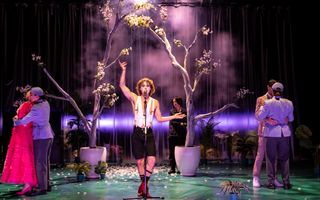In Act 2, Scene 2, the countess Olivia sends Malvolio with a ring to return to Viola (disguised as Cesario). The issue is, Viola never gave Olivia a ring. Confused, Viola shares this soliloquy with the audience:
VIOLA
I left no ring with her: what means this lady?
Fortune forbid my outside have not charm'd her!
She made good view of me; indeed, so much,
That sure methought her eyes had lost her tongue,
For she did speak in starts distractedly.
She loves me, sure; the cunning of her passion
Invites me in this churlish messenger.
None of my lord's ring! why, he sent her none.
I am the man: if it be so, as 'tis,
Poor lady, she were better love a dream.
Disguise, I see, thou art a wickedness,
Wherein the pregnant enemy does much.
How easy is it for the proper-false
In women's waxen hearts to set their forms!
Alas, our frailty is the cause, not we!
For such as we are made of, such we be.
How will this fadge? my master loves her dearly;
And I, poor monster, fond as much on him;
And she, mistaken, seems to dote on me.
What will become of this? As I am man,
My state is desperate for my master's love;
As I am woman,--now alas the day!--
What thriftless sighs shall poor Olivia breathe!
O time! thou must untangle this, not I;
It is too hard a knot for me to untie!
Act 2, Scene 2
Read the extract above then answer the following questions:
- What is the function of a soliloquy, and why do you think Shakespeare employs it in this scene?
- Write down any words you might be unfamiliar with and look up their definitions. You might take note of the following words:
- cunning
- churlish
- waxen
- fadge
- thriftless - What do you think Viola means when she says “Poor lady, she were better love a dream.”
- In the speech Viola reflects on the concept of disguise. How does she feel about disguise in this moment, and why?
- Viola moves through a range of emotions in this soliloquy. Write down what emotions you think she feels in order, from the top of the speech to the end, next to each line.
- Viola calls herself a “poor monster.” What do you think she means by this?
- What conclusion does Viola come to at the end of the soliloquy?
- What do you think Viola should do in this moment, and why? What might you do if faced with this predicament?





